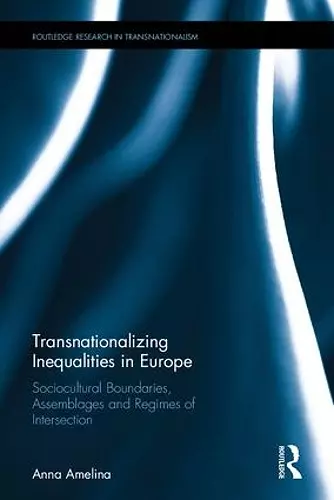Transnationalizing Inequalities in Europe
Sociocultural Boundaries, Assemblages and Regimes of Intersection
Format:Hardback
Publisher:Taylor & Francis Ltd
Published:10th Oct '16
Currently unavailable, and unfortunately no date known when it will be back
This hardback is available in another edition too:
- Paperback£41.99(9780367876753)

Unequal life-chances became a key feature of cross-border migration to, and within, the enlarged Europe. Combining transnational, intersectional and cultural-sociological perspectives, this book develops a conceptual tool to analyse patterns, contexts and mechanisms of these cross-border inequalities.
This book synthesizes the theories of social boundaries and of intersectionality, approaching cross-border relations as socially generated and as an inherent element of contemporary social inequalities. It analyses the mechanisms of cross-border inequalities as ‘regimes of intersection’ relating spatialized cross-border inequalities to other types of unequal social relations (in terms of gender, ethnicity/race, class etc.). The conceptual arguments are supported by empirical research on cross-border migration in Europe: migration of scientists and care workers between Ukraine and Germany.
This book integrates the analysis of space – including cross-border categories of global and transnational – into intersectionally-informed studies of social inequalities. Broadly, it will appeal to scholars and students in the areas of sociology, political sciences, social anthropology and social geography. In particular, it will interest researchers concerned with transnational and global social inequalities, the interplay of the categories ‘gender’, ‘ethnicity’ and ‘class’ on the one hand and global and transnational relations on the other, theories of space and society, and migration and mobility in Europe.
Transnationalizing Inequalities in Europe is a highly original volume that builds on theories of globalization, transnationalization, spatialization, boundaries, and intersectionality to examine cross-border social inequalities. Whilst focused on transnational migration, mobility, and post-migration settlement, and using case studies between Ukraine and Germany, the book has much wider application elsewhere, and much wider relevance for the many other transnational processes. As such, and in raising key practical questions for doing transnational research, it should have a strong impact as a landmark text.
Jeff Hearn, Örebro University, Sweden; Hanken School of Economics, Finland; University of Huddersfield, UK; author of Men of the World
Transnationalizing Inequalities offers its readers an original and highly productive dialogue between cultural sociology, intersectional theory and poststructuralist thought. It uses this conversation to make new sense of pressing questions of inequality across Europe’s fluid borders. Amelina’s thinking is as sharp as the inequalities she maps, and as subtle as some of the mechanisms of power she uncovers.
Professor William Walters, Department of Political Science & Department of Sociology/Anthropology, Carleton University, Canada
Theorists of social inequality have often been criticized for their inability to overcome methodological nationalism, an approach that treats the nation state as most important category of analysis. Anna Amelina’s book is a pioneering, outstanding work which takes up these challenges and presents new theoretical tools for investigating the transnationalization of social inequalities in the 21st century from an intersectional perspective. A must read for students and scholars of migration- gender- and social inequality studies.
Helma Lutz, Goethe University Frankfurt, Author of ‘The New Maids. Transnational Wo
ISBN: 9781138679870
Dimensions: unknown
Weight: 430g
218 pages